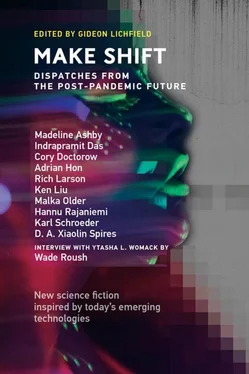Brishti watched keenly through the giant’s transparent chest, as their hands righted the fallen trees that could be salvaged, and embedded their exposed roots into heaped earth again, packing the soil around their trunks. Around her, the man’s smaller arms moved in the same way, hands dark and calloused like the bark of those trees he was restoring, but so delicate in their movements. His body of flesh and blood looked frail in comparison to the one that enclosed them, his limbs tough but wiry.
They never left the inside of the giant, though it began to stink of damp. Brishti wondered if they would be inside the chest forever, watching the city pass by. The giant spoke to the other giants through their instruments, voices crackling disembodied over speakers, coordinating efforts. Sometimes, the cousins of the giants—solar and biofuel cars and lorries—passed by along the roads, cousins also to the still rows of garibaris. Reformed like the giants themselves were—some had been used for military and police, in past lives. As Brishti watched the city, she knew that it was her home, though she had no other clear memories of her life before, except of the giants planting the trees that were everywhere. The storm, or something else, had knocked them out of her head.
Sometimes masked people came out of buildings, and walked out into the roads to give thanks to the giants. They came with offerings of fruit and vegetables from the rooftop gardens of their high-rises—capsicum, tomatoes, apples, mangoes, cucumbers. The giant would squat low to respect these pilgrims. The civilians would wave through the glass, brush their palms against the giant’s limbs, and leave their offerings of food in a small mouth below the giant’s chest, which was flipped open from the instrument panel inside. Offerings to gods. Brishti remembered this. This was the country they lived in. Giants were gods too, in some of the stories. The giant swallowed these offerings. But inside, the giant’s heart ate nothing. So Brishti ignored the gnawing in her gut. She drank from the water tap he’d shown her among the instruments.
Brishti didn’t speak. The heart needed to beat, so the giant would move and help the people of the city, the ones inside their garibaris and high-rises and ancient crumbling houses that had survived the age of development by donating their plots of land to reforestation, their centuries-old structures hidden by trees. It was work that required a deep attention.
As the sun receded behind the city, windows began to glow through the foliage trailing down from rooftop farms and gardens and snaring the remnants of useless billboards whose faces wept with rust. The roads and paths of Kolkata glistened in the firefly glow of alor gach, the bioluminescent trees and plants that had replaced most streetlamps, their light-flecked leaves giving the impression of stars rustling close enough to touch.
In the quiet, under a sky ripped cloudless and moon-shot after the storm, the giant came to rest at the shore of one of the many streams and canals of Kolkata, which were only a few years or decades old at most. Along the water, there were garibaris parked in their permanent spots, solar-powered lights glimmering behind their brightly curtained windows, the shadows of their residents flitting like moths trapped in paper lanterns.
The humming of the giant’s body died down. Insects drummed against the glass of their chest, a stringed charm of dried chilis and lemons twirling in front of the panes. The giant’s heart picked Brishti up off his lap and sat her down in the extra seat next to his. She looked nervous to finally leave his lap. He pushed a lever on the instrument panel.
The ribs of the giant’s chest hissed open a little, letting a cool draught of air inside.
“You can speak, child?” the giant’s heart asked, turning to her. “You understand Bangla?”
She nodded.
“Do you have a name?”
She said nothing.
“That’s alright. What about a home I can take you back to?”
She shook her head.
“You are lost.”
She nodded.
“And found,” he peered at her. “Do you remember anything? That the world is sick? That you should stay away from people?”
She nodded.
“Good. Good. This,” he waved his arm. “This is a mekha. I, too, am mekha. You understand this?”
She nodded.
“The mekha allows me to be one with god, so I may give service to the people of Kolkata, help them in this age of plagues. Our bodies,” he patted his chest. “They can’t protect us. But this body can. It is an emanation of god. In here, you are safe. You are one with god.”
She said nothing.
“Ah! Are you hungry?” he said, and his stomach growled to follow his words.
She giggled.
He smiled at her. “I am a fool. I forget not everyone is like me. I have been alone for a long time. I go long hours without eating, you know… when I am one with my mekha. Look at me babbling. Words won’t fill your little stomach.”
He freed himself of the braces that connected him to the giant’s body, collapsing them with practiced movements and letting them hang in the air above the seat. “Remember the food those people gave the mekha? It is their thanks. Now we eat it.” He played with his instrument panel, his fingers dancing across the mystery of switches. Something hissed and clanked in the guts of the giant. He bent down and opened a hatch below the console, revealing a cache of fruits and vegetables fed to the giant by grateful people over the day. There was a citrus scent of disinfectant in the air. He handed Brishti an apple, and took one himself, biting into it. Brishti did the same, juice squirting on to her dirty face.
“You’re… a boy or a girl?”
Brishti paused as if to think about this, and nodded.
“Boy?”
She shook her head.
“Girl. Of course. Stupid me.”
She crunched on the apple.
“Do you have a… a mother and father?”
The words tumbled out of her mouth with bits of half-chewed apple, as if she hadn’t been silent all day, her voice small and cracked in the tight space of the giant’s chest, assertive in its desperation: “You are my father.”
He looked at her, his chewing stilled.
She continued devouring her apple, not looking at him. As if she were suddenly afraid of looking at him, for fear that he wasn’t actually there.
He tapped her shoulder gently. He noticed the tears rolling down her cheeks now, mingling with the juice on her lips, salt and sugar that she licked quietly. She concentrated on the apple, and nothing but the apple, taking huge chunks out of it with her teeth. He waited a moment, and tapped her shoulder again. She looked at him fearfully with her big brown eyes.
“You are right,” he said, softly. “I am your father. By god’s grace, I am your father.”
The giant’s body pinged in the silence as it cooled. The girl looked down at her mostly eaten apple. Her hands were shaking.
“I remember you,” she said, voice wavering.
“You do?” he asked cautiously.
“I saw you and the other giants carry the forest on your shoulders. You planted it in the city.”
He looked out of the giant’s ribs. Indeed, there it was—the “forest,” entwined into the labyrinth of the city. He and all the mekhas in Kolkata had walked hundreds of kilometers across Bengal to a tree farm and transplanted the harvest to the city, replacing smaller streets with groves, seeding the empty spaces of fields, racetracks, golf greens, and club lawns into forest land for new villages of public housing. He couldn’t remember how long it had been since that great march, carrying young trees like umbrellas against their shoulders, along endless highways emptied by the age of plagues. It had been one of many marches, performed over decades, before he became a mekha. The last one had been five, six years ago, maybe. The girl was older than he’d expected, if she could remember that. He barely remembered Kolkata when it was less reclaimed by forest, when cars moved in armies down the streets like he and his fellow mekhas had during the forestation march, when people flooded the footpaths like water did after the storms. Like his parents. People who, in another time, would have had to risk death and walk thousands of kilometers to their distant villages, when pandemics hit and they were left with no jobs or help by uncaring governments. His parents had no giants to walk for them on those harsh migrations, no free housing to give them shelter, not even makeshift villages of repurposed cars, no urban forest from which to gather communal food.
Читать дальше












